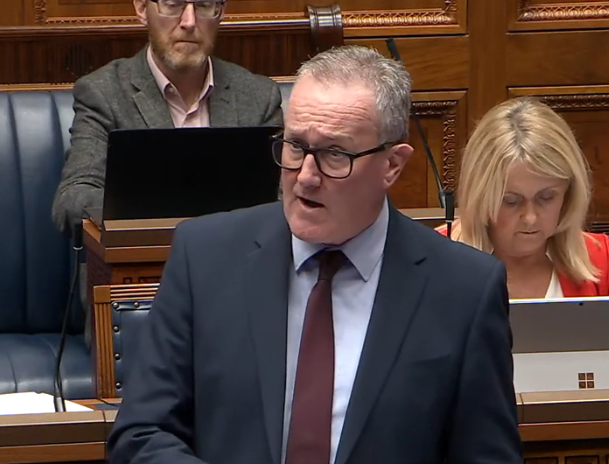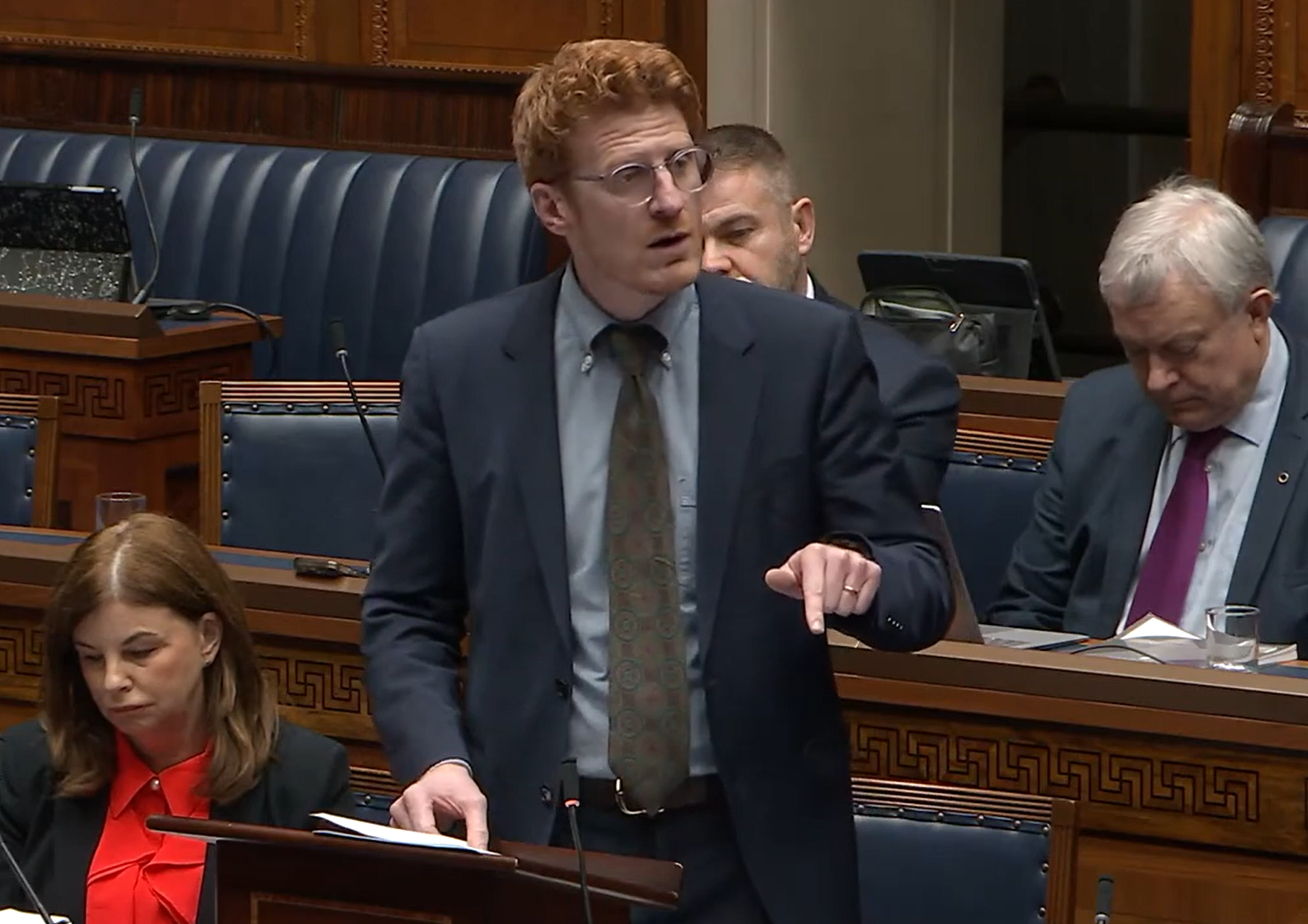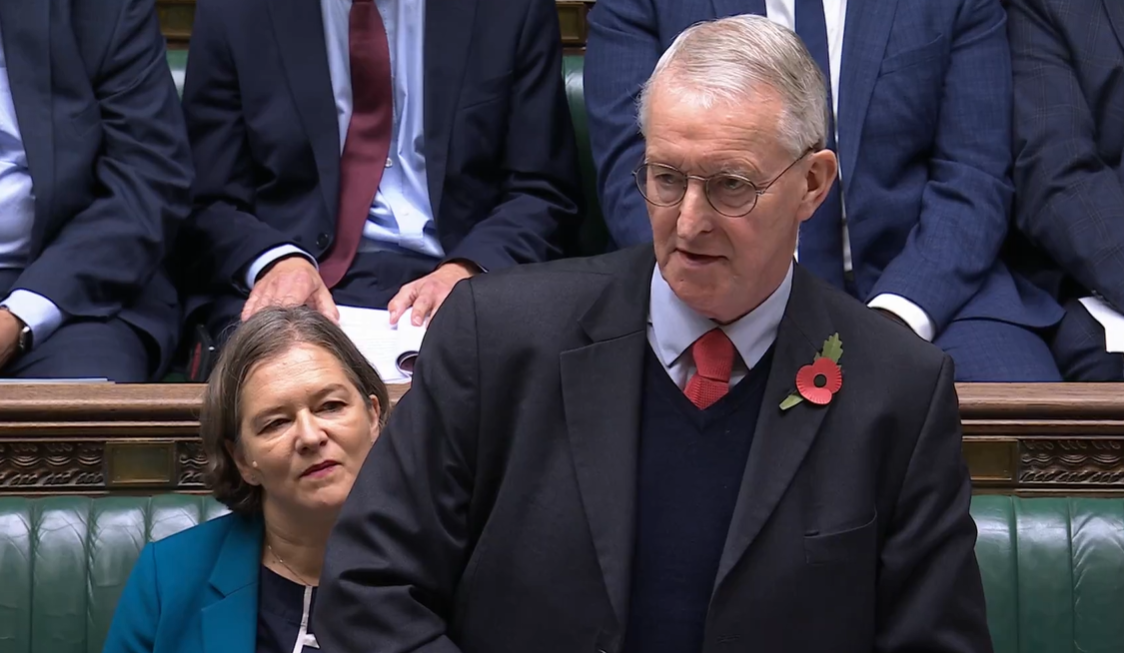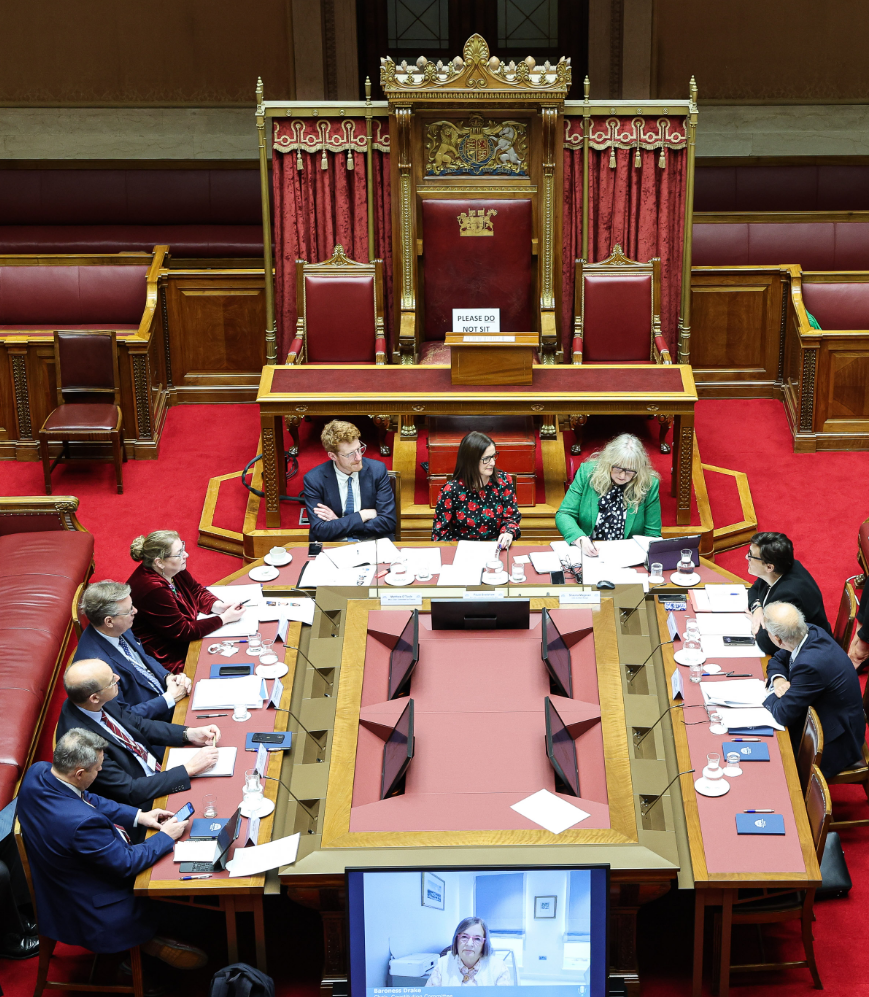Brexit & Beyond newsletter
26 November 2024
 Welcome to the 26 November 2024 Brexit & Beyond newsletter
Welcome to the 26 November 2024 Brexit & Beyond newsletter
This issue of Brexit and Beyond gives a round up of activities over the past fortnight. At the Assembly, the Minister for the Economy and the First Minister updated Members on meetings of the North South Ministerial Council.
In advance of the democratic consent vote, the Leader of the Opposition proposed a motion on the EU relationship. The Committee for the Executive Office received a briefing on UK intergovernmental relations.
At Westminster, the International Agreements Committee took evidence from Jonathan Reynolds MP, the Secretary of State at Department for Business and Trade. The Northern Ireland Affairs Committee heard from the Secretary of State Hilary Benn MP.
Finally, the Assembly hosted the Interparliamentary Forum (IPF) on 15 November.
- North South Ministerial Council
- Opposition Business: EU Relationship
- UK Intergovernmental relations
- Windsor Framework Democratic Scrutiny Committee
- Draft Radio Equipment (Amendment) (Northern Ireland) Regulations 2024
- International Agreements Committee
- Northern Ireland Affairs Committee
- Executive oversight and responsibility for the UK constitution
- Interparliamentary Forum
- Other news
Northern Ireland Assembly
North South Ministerial Council
On Monday 11 November, the Minister for the Economy made a statement in the Chamber on a meeting of the North/South Ministerial Council (NSMC) in trade and business development sectoral format on 23 October 2024

The Minister for the Economy makes a statement on the meeting of the NSMC in trade and business development sectoral format on 23 October 2024
The NSMC welcomed the overall achievements of InterTradeIreland since a previous sectoral meeting in April 2024, including achieving a business development value of £82 million and providing crucial investor readiness supports. The Council commended InterTradeIreland for its contribution via its trade and development programmes for small and medium-sized companies trading across the border and in both jurisdictions. Ministers recognised the positive impact of the innovation and technology programmes administered by InterTradeIreland and its support for building relationships between companies and researchers.
The Council welcomed the work of InterTradeIreland alongside Enterprise Ireland and Invest NI in developing a cross-border enterprise cooperation scheme, which was awarded €30 million of Shared Island funding.
The NSMC approved the reappointment of Margaret Hearty as chief executive officer of InterTradeIreland, for a four-year term with effect from 21 April 2025. The NSMC also appointed members to the board of InterTradeIreland. The Minister told Members a number of further vacancies will arise early in 2025.
The following day, the First Minister updated the Assembly on the thirteenth institutional meeting and twenty-eighth plenary meeting of the North/South Ministerial Council (NSMC) on 13 September 2024 at Dublin Castle.
The NSMC noted that work is under way to finalise the 2025 business plans and budgets. Plans to mark the twenty-fifth year since the establishment of the NSMC and the North/South implementation bodies later in the year were also noted.
The NSMC reaffirmed its support for the PEACE PLUS programme and welcomed the contribution of the programme to promoting peace, reconciliation and prosperity. The British Government's association to the Horizon Europe research programme was also welcomed.
The Council noted that the Finance Departments have developed a framework that will allow some flexibility while preserving the use of the funding ratios as the primary funding mechanism for the North/South bodies.
The First Minister also provided an update on the NSMC plenary meeting, which was also held on 13 September.
The Council discussed business- and trade-related matters. It considered New Decade, New Approach commitments with a cross-border dimension. The NSMC agreed that commitments under New Decade, New Approach should remain on the agenda of relevant meetings and that further updates will be provided to future NSMC plenary meetings.
At the end of its meeting, the NSMC approved a schedule of future sectoral meetings, a meeting in institutional format and the next plenary meeting in spring 2025. That concludes the report on the NSMC plenary meeting.
Opposition Business: EU Relationship
On Monday 18 November, the Leader of the Opposition, Matthew O’Toole MLA (SDLP) proposed a motion on the EU Relationship which Jonathan Buckley MLA (DUP) called “a dry run for what will come in the coming weeks: the vote on the democratic consent mechanism that was enshrined in article 18 of the original protocol”. The motion noted the beginning of the democratic consent process and called for the Executive to continue its efforts to operate the Protocol/Windsor framework efficiently as well as calling on the Secretary of State to ensure that any independent review of the functioning of the Windsor framework, as provided for under Schedule 6a to the Northern Ireland Act 1998, investigates and makes proposals to the UK and EU on other related post-Brexit issues affecting Northern Ireland.

Matthew O’Toole MLA proposed a motion on the EU Relationship
Eóin Tennyson MLA (Alliance) moved an amendment to expand the motion on two issues: “the need for a comprehensive UK-EU veterinary and sanitary and phytosanitary (SPS) agreement and an electronic travel authorisation exemption for tourists crossing the land border.”
The Assembly divided and agreed the main question as amended.
Check out our website for more information on the democratic consent mechanism here.
UK Intergovernmental relations
The Committee for the Executive Office received a briefing on UK intergovernmental relations from the Assembly’s EU Affairs Manager, Shauna Mageean, on Wednesday 13 November. She provided an update to Members which covered the UK-EU governance structures under the Withdrawal Agreement and the governance under the Trade and Cooperation Agreement. She also gave Members information on the current intergovernmental relations structures within the UK, drawing Members’ attention to the annual report published by its Secretariat. Finally, Shauna briefed the Committee on Common Frameworks, informing Members of 32 Common Frameworks that apply in Northern Ireland.
Shauna told Members that the Executive has indicated that Frameworks must be signed off by the entire Executive. To date, only the Hazardous Substances (Planning) Common Framework has been fully implemented in the UK.
More information can be found on the Assembly’s website here.
Windsor Framework Democratic Scrutiny Committee
On 14 November, the Windsor Framework Democratic Scrutiny Committee received legal advice and considered departmental evidence on EU Regulation 2024/2838 as regards certain reporting obligations in the area of common organisation of the markets in fishery and aquaculture products and EU Directive 2024/2839 as regards certain reporting requirements in the fields of food and food ingredients, outdoor noise, patients’ rights, and radio equipment. The Committee decided not to conduct inquiries into these EU acts.
The Committee met again on the 21 November when it received legal advice and considered departmental evidence on three EU acts comprising the Internal Market Emergency and Resilience Act (IMERA) package (formerly called the Single Market Emergency Instrument or SMEI): Regulation (EU) 2024/2747 is the main Internal Market Emergency and Resilience Act and it establishes a framework of measures. The two accompanying omnibus acts: Regulation (EU) 2024/2748 and Directive (EU) 2024/2749 amend harmonised EU product legislation to ensure that strategic goods can be marketed quickly to address shortages in the event of a market crisis.
The Committee decided not to conduct inquiries into these EU acts.
Westminster
Draft Radio Equipment (Amendment) (Northern Ireland) Regulations 2024
On Tuesday 12 November, the House of Commons Delegated Legislation Committee debated the Draft Radio Equipment (Amendment) (Northern Ireland) Regulations 2024. The draft regulations, which were laid before the House on 9 October, will implement common charger measures in Northern Ireland. In particular, USB-C will become the common charging point for a range of portable electrical devices that require wired charging.
The Parliamentary Under-Secretary of State for Business and Trade (Justin Madders MP) to the Committee the “instrument is expected to have limited impact in practice.” He explained that to provide for the “unique dual access to the UK internal market and the EU single market, certain EU legislation continues to apply in Northern Ireland under the terms of the Windsor framework, including the EU radio equipment directive.”
“This instrument introduces new regulatory requirements for specific categories of electrical and electronic equipment that use wired charging and are placed on the Northern Ireland market. It amends the 2017 regulations to provide for simplification, whereby USB-C will be the common charging port, meaning that one charger will work for multiple devices, bringing cost savings and environmental benefits. The instrument will standardise fast charging technology, meaning that the charging speed is the same when using any compatible charger for a device.”
“The Northern Ireland Department of Justice has confirmed that it considers that the offences provided for by the instrument are consistent and proportionate and will not have any negative impact on the criminal justice system in Northern Ireland. Officials in the Office for Product Safety and Standards will provide industry guidance to ensure that businesses have all the information they need on how to comply with the new requirements, and they will liaise with Northern Ireland district councils, which are responsible for enforcing the radio equipment regulations in Northern Ireland, ensuring that they have all the necessary information to do that.”
Robin Swann MP (UUP) sought clarification about what engagement there been those with district councils (the enforcing authorities) on the regulation. In response, the Parliamentary Under-Secretary of State assured him officials have worked closely with the local authorities in Northern Ireland on the application of the regulations.
International Agreements Committee
On Monday 18 November, the House of Lords International Agreements Committee took evidence from Jonathan Reynolds MP, the Secretary of State at Department for Business and Trade and Amanda Brooks, the Director General for Trade Policy, Implementation and Negotiations at his Department. The Secretary of State told the Committee that the Government “will pursue what we call a “twin-track” approach to trade, by which I mean that we can rebuild that relationship with the European Union—some work is required on that—at the same time as making the best of what is available around the rest of the world.”
Discussing UK trade with the US, the Secretary of State said: “The US is a major and important trading partner for the UK, with £300 billion of bilateral trade. However, compare that to the EU with its more than £800 billion of bilateral trade. Clearly, if there are things that we are offered or asked to do that would result in an adverse relationship on the European side, we would have to weigh the consequences of that.”
Focusing on the “reset”, the Secretary of State said “the EU reset is about more than just trade, although it is an important part of it. All the analysis and data that underpins that reset is owned and provided by the Department for Business and Trade.” Regarding his Department’s work on this issue he continued “there are no tensions between our ambitions with the rest of the world and the EU reset. There are a couple of areas where the relationship is complex, particularly around SPS and food and agricultural standards, but we are more than confident that we can manage those adequately.”
Amanda Brooks submitted that the Department takes “a particular interest… on services, investment, digital and technical barriers to trade and good regulatory practice. Those are areas where we lead the specialised committees that are already constituted under the EU-UK Trade and Cooperation Agreement, but obviously we have wider interests in goods regulation”.
The Secretary of State touched on the Product Regulation and Metrology Bill which has been criticised for being a skeleton bill. He called it a framework bill “that [will] empower the state to make decisions, but the political decisions will come later from those political powers and be subject to all the same parliamentary scrutiny and debate that we would usually accept.”
Northern Ireland Affairs Committee
On Tuesday 19 November, the House of Commons Northern Ireland Affairs Committee took oral evidence from Hilary Benn MP, Secretary of State for Northern Ireland, Fleur Anderson MP, Parliamentary Under-Secretary of State for Northern Ireland and officials from the Northern Ireland Office. The Secretary of State reassured the Committee that he works “extremely closely” with the Minister for the Cabinet Office, Nick Thomas-Symonds, who is the co-chair of the Withdrawal Agreement Joint Committee. He said they both “are both trying to ensure that the Windsor framework is able to operate successfully.”

Hilary Benn MP, Secretary of State for Northern Ireland, gives evidence to the Northern Ireland Affairs Committee
The Secretary of State continued “We have reminded Cabinet colleagues that it is really important to take into account the implications for Northern Ireland given the Windsor framework and the policy decisions that you were making. We have done that on a number of occasions. The guidance has gone out under section 46 reminding all Ministers in all parts of Government about their obligations.”
Regarding negotiations on a veterinary and SPS agreement, the Secretary of State tole the Committee that “The European Union has to decide a mandate for any such negotiations.” “Given the challenges in respect of the movement of, in particular, agricultural goods, food and plants across the Irish Sea from GB to Northern Ireland, a veterinary and SPS agreement would be a big step forward. It will require the Government and the European Union to agree how that is going to be sequenced, but the desire is very clear.”
The Secretary of State provided the Committee with an update on the Veterinary Medicines Working Group (of which DAERA Minister Andrew Muir MLA is a member) and said “all the efforts that can be made to ensure continued supply have been made.” He identified it is “a practical problem”, “to do with where batch testing takes place, pack sizes and all those very practical points.” He continued that “If we come to the conclusion, and can persuade the EU, that there is no other way for these medicines to be available, we both have a problem, and farmers and vets have a problem in Northern Ireland, so what are we going to do about it? In the end, the EU moved on human medicines when we were in the same position and it changed its law, which showed that there is capacity in the Commission to be pragmatic while we are implementing the Windsor framework in good faith”.
The Secretary of State also committed to the previously delayed implementation of changes to customs and parcels by March 2025. He said, “It is really important that we do that, both to honour the commitments that we made in relation to parcels and to get the benefit of the customs easements that everybody moving goods across the Irish Sea would very much like to see.”
Executive oversight and responsibility for the UK constitution
On Wednesday 20 November, the House of Lords Constitution Committee took evidence from Pat McFadden MP, Chancellor of the Duchy of Lancaster and Minister for Intergovernmental Relations, UK Government; Nick Thomas-Symonds MP, Paymaster-general, Minister for the Cabinet Office and Minister for the Constitution and European Union Relations; and, Darren Tierney, Director General, Propriety & Constitution Group, Cabinet Office.
Pat McFadden MP told the Committee that changes have been made in the Cabinet Office since the election. The principal constitutional responsibilities that the Office has are around intergovernmental relations, where the Union and Devolution Directorate was brought back into the Cabinet Office. He explained that Nick Thomas-Symonds, the Minister for the Cabinet Office, leads on House of Lords reform.
Regarding intergovernmental relations, Pat McFadden MP also told the Committee about the Union and Constitution Cabinet committee. This brings together the Cabinet Office, the territorial Secretaries of State, the law officers and the business managers in the Lords and the Commons.
Nick Thomas-Symonds MP told the Committee about the Parliamentary Business and Legislation Committee, on which he sits with the territorial Secretaries of State for Scotland, Wales and Northern Ireland.
Regarding the role of role of a Prime Minister’s envoy to the nations and regions, Pat McFadden MP said “As we meet today, we do not have plans to appoint somebody else to the role.”
Interparliamentary Forum
On Friday 15 November 2024, the Interparliamentary Forum (IPF) met at the Northern Ireland Assembly. Chairs and Convenors of Committees from the Northern Ireland Assembly, Scottish Parliament, Senedd Cymru, House of Commons and House of Lords attended. This was the sixth meeting of the IPF. The Forum agreed to explore how it can encourage UK Ministers and officials to respond positively and in a timely way to requests from committees in devolved administrations to give evidence in the spirit of reciprocity. It agreed to write to the Executive Office to seek an update on the latest position on Common Frameworks. The Forum also agreed to invite Chancellor of the Duchy of Lancaster and Minister for Intergovernmental Relations Pat McFadden to attend the next meeting of the Forum to discuss his priorities for this important area of work.

The meeting of the Interparliamentary Forum at the Northern Ireland Assembly
Other news
- The Independent Monitoring Authority has written to the Home Office to seek seeks clarity on legal right for EU citizens to go on holiday or visit family abroad after applicants denied re-entry at UK border.
- The UK government is recruiting a new negotiator to lead the government's relationship with the European Union and negotiations with the EU "on key UK interests", with mentions of trade, security and border policy.



